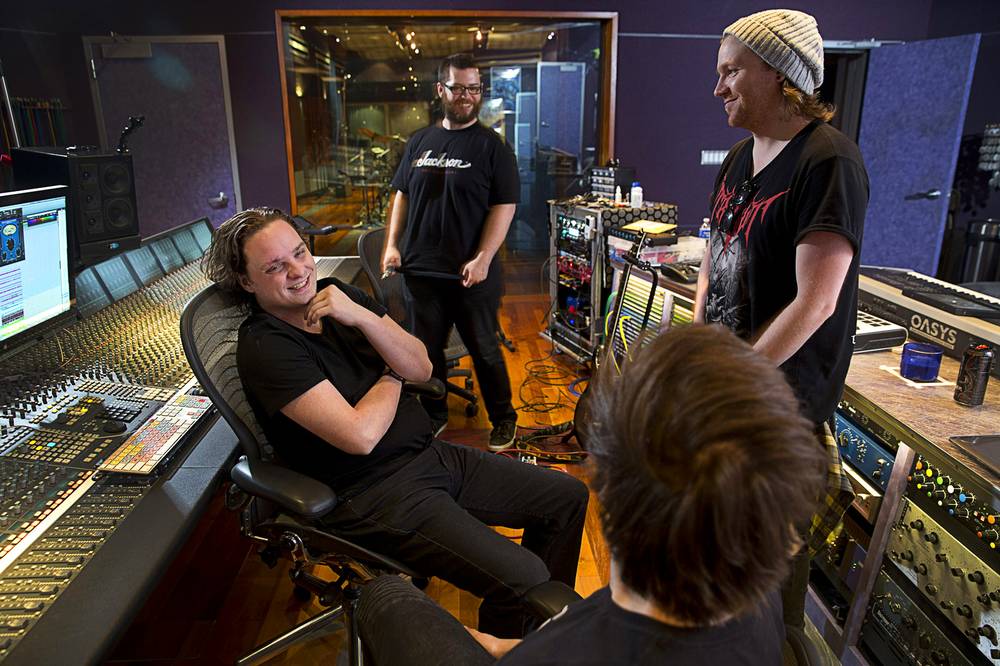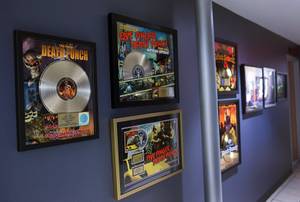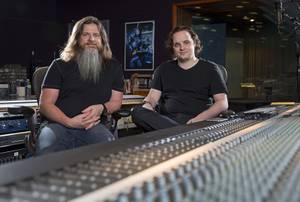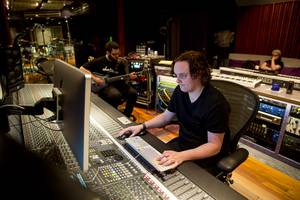Kane Churko prefers the small room, one of the least spacious in this Xanadu of rock-and-roll dream weaving.
For starters, everything’s within arm’s reach here: the synth, the computer mouse, the Ace Frehley action figure eyeing intruders from atop a nearby speaker. Also, it reminds him of a certain Swiss bomb shelter.
Dressed in the shade of a solar eclipse, his shoes, shirt and jeans as black as the sunglasses tucked into his V-neck, Churko begins a tour of sprawling Henderson recording complex The Hideout in the compound’s not-so-sprawling Studio C.
The digs are relatively new for Churko, 30, and his dad Kevin, hard rock’s leading father-son production duo. They own and operate The Hideout, relocating here in January from the south end of Las Vegas Boulevard, upsizing from 1,400 square feet to 13,000. It’s a fantasia for both recording geeks and the big-selling artists whose gold and platinum records deck the walls, with four tricked-out studios for the former, posh lounges outfitted with stripper poles and Guns N’ Roses pinball machines for the latter.
Despite the presence of two massive recording suites, one of which Vegas hard rockers Five Finger Death Punch are using to track their latest album, Churko prefers to work in a much cozier spot in the front of the building.
Its tight dimensions mirror that of a bunker built beneath Churko’s teenage house in Switzerland, where his family relocated from their native Canada in 2000 while the elder Churko worked with British super-producer Mutt Lange. It was there, in a small home studio, that Kane mastered Pro Tools, the now-ubiquitous recording software that ushered in a digital revolution in music making.
“No one knew what Pro Tools was,” says Churko, who embraced the program, along with his father. “I’ve always loved technology, in every capacity. I’m an early adopter of everything.”
Churko’s skill with Pro Tools gained him entrance into the music business at an early age. While still in his teens, he was earning credits on Smash Mouth and Maroon 5 songs and providing engineering assistance on Bob Dylan’s well-received Modern Times album. Shortly thereafter, he was co-writing Ozzy Osbourne tunes as well as helping to pen hits for the aforementioned Death Punch, whom his father helped shepherd into one of contemporary metal’s biggest acts. Both Churkos have proven themselves adept at getting heavy bands heavy airplay, earning them clients like Disturbed, Rob Zombie, Slash and Hellyeah.
Basically, if you’re a hard-rock band trying to get a song on the radio nowadays, these are the dudes you come to see.
Kane has increasingly made a name for himself, beginning with his work on Blood, the 2012 breakout from female-fronted In This Moment, whose hit title track Churko conceived on an acoustic guitar in his bedroom. That record was a game changer: The band’s previous three releases had sold around 60,000 copies each; Blood did close to 300,000.
The album was powered by several Kane Churko trademarks: He’s big on hummable riffs combined with ample programming, a mix of tunefulness and technology. His songs tend to rage and pulse, throb and explode.
“It kind of became my calling card, soundwise,” he says of Blood. “It gave me an identity.”
It also gave him a Juno award, the Canadian equivalent of a Grammy, and helped him land higher-profile gigs, like writing and producing the majority of the tracks on Papa Roach’s 2015 album F.E.A.R.—which reversed a two-album sales decline for the band—and collaborating with acts ranging from metalcore favorites Falling In Reverse to Japanese superstars One OK Rock.
Though he tends to get hired by harder-edged bands, the clean-cut, baby-faced Churko is the furthest thing from a metal dude in both appearance and taste. “I’ve only bought like two hard rock records in my life,” he acknowledges, approaching his work more like a dance or pop producer might.
“I like contrast and I like fusion. I love making rock music that incorporates all these things that aren’t supposed to be in rock music. I like making pop music that’s maybe heavier than pop music is supposed to be. If I was going to write a song for Katy Perry or Lady Gaga, I’d be like, ‘How do we make the heaviest pop songs ever made?’”
Churko’s a conscientious populist, a curator of what he likes to call “competitive art,” always striving to help a band build a bigger audience while being mindful of the need to cultivate an authentic voice to generate lasting success. This is the age-old bugaboo for just about anyone seeking to pay the rent with their art, the challenge inherent in balancing commerce and creativity.
“I think there’s still ways to be yourself and say what you want to say within the framework of trying to reach more people,” he says. “I just don’t believe that you have to turn that part of your brain off to be artistic. I think you can always do both. It’s so easy to make art. It’s so hard to make art that sells.”
The difficulty of the latter gets magnified when working within a genre where sales have been seriously receding. According to Billboard, none of the top 10 albums of 2015 were released by rock bands. In the past five years, only two rock groups, Imagine Dragons and Mumford & Sons, have dropped new albums that have sold a million copies. And those acts are about as hard as a Nerf machete.
As Churko sees it, part of the reason why hard rock is struggling is because of how formulaic and narrowly defined the music has become, at least on the mainstream level.
“When I’m hired to make rock songs, there’s usually a pretty specific goal: We’ve got to get on these 25-30 radio stations, and to do that, we have to mix in with everything while standing out just enough,” he says. “There’s a little more rules for playing that game.”
Churko understands these rules, adhering to them just enough to catch the ear of status quo-favoring radio programmers. He wants to write hits, after all. But he also wants to write off what he sees as outmoded ideas of hard rock.
“You’re not going to get people who already don’t like the current version of rock music to like it by maintaining those purist ideologies,” he says. “The purists in rock are going to turn it into a niche. The only people I don’t get along with are purists, because I’m an anti-purist.”
By this point in the conversation, Churko has wandered into Studio A, the biggest of the four, its control room dominated by a massive mixing board whose thousands of knobs are like little tombstones to Churko, commemorating a dead technology thanks to the recording software that’s rendered it obsolete.
“The only knob I’m using is the volume knob,” he chuckles. “It’s a $100,000 volume knob.” To Churko, it’s a totem of a bygone era.
Before long, he begins the day’s recording session with British metallers The Raven Age, tasked with preventing bands of this ilk from becoming the same.










